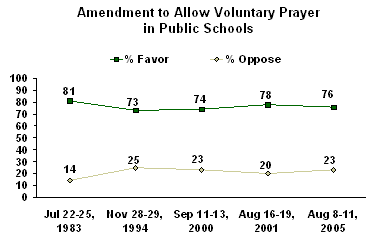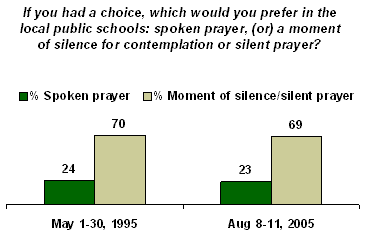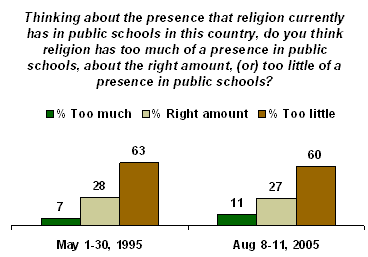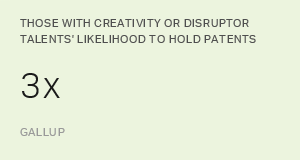GALLUP NEWS SERVICE
PRINCETON, NJ -- A new Gallup survey confirms that whatever arguments political leaders make about separation of church and state in the public schools, most Americans don't seem to be persuaded. Large majorities continue to favor allowing voluntary prayer in public schools, and believe that religion has too little presence in them. Still, if given a choice, most people prefer a moment of silence, rather than a spoken prayer.
The poll, conducted Aug. 8-11, finds 76% of Americans favor "a constitutional amendment to allow voluntary prayer in public schools," while just 23% oppose such an amendment. This is not new. In 1983, a similar poll showed 81% in favor, and polls in the past decade show about three-quarters of Americans consistently supportive.

A major stumbling block for any such amendment would be the type of voluntary prayer allowed. The poll shows that only 23% of Americans prefer some type of spoken prayer, while 69% favor a moment of silence for contemplation or silent prayer. These views are essentially the same as those expressed a decade ago in a similar poll.

Related to their support of school prayer, most Americans also believe that religion should have a greater "presence" in public schools. Just 11% say religion already has "too much" presence, and 27% say it has the right amount. A clear majority of Americans, 60%, believe religion has "too little" presence. These views are similar to those expressed in a 2001 Gallup survey.

Not surprisingly, views on this matter are highly related to religious orientation, and to a lesser extent, party affiliation.
- The more frequently people attend church, the more likely they are to favor a constitutional amendment permitting voluntary prayer -- from 88% among people who attend weekly to 63% among those who seldom or never attend.
- Protestants are most likely to favor school prayer (82%), followed closely by Catholics (75%). A majority of non-Christians oppose a constitutional amendment, by 55% to 44%.
- Among party groups, Republicans are most likely to support an amendment (88%), but both independents (72%) and Democrats (67%) also give majority support.
Please tell me whether you favor or oppose a constitutional amendment to allow voluntary prayer in public schools.
|
Favor |
Oppose |
|
|
% |
% |
|
|
Overall |
76 |
23 |
|
Church attendance |
|
|
|
Weekly |
88 |
11 |
|
Nearly weekly/Monthly |
82 |
17 |
|
Seldom/Never |
63 |
35 |
|
Religious affiliation |
|
|
|
Protestants |
83 |
17 |
|
Catholics |
75 |
21 |
|
Non-Christians |
44 |
55 |
|
Party |
|
|
|
Republicans |
88 |
12 |
|
Independents |
72 |
25 |
|
Democrats |
67 |
32 |
A majority of all major demographic subgroups of Americans surveyed prefer a moment of silent prayer to spoken prayer. The greatest support for spoken prayer is found among weekly churchgoers (39%), while only 10% of infrequent churchgoers favor that type of prayer.
Protestants (30%) are twice as likely as Catholics (15%) to want a spoken prayer, and three times as likely as non-Christians (10%).
Differences are slight among party groups, from 26% support for spoken prayer among Republicans to 21% among Democrats.
If you had a choice, which would you prefer in the local public schools -- [ROTATED: spoken prayer, (or) a moment of silence for contemplation or silent prayer]?
|
|
Moment of silence/ |
|
|
|
|
% |
% |
% |
% |
|
|
Overall |
23 |
69 |
5 |
3 |
|
Religious attendance |
|
|
|
|
|
Weekly |
39 |
57 |
2 |
2 |
|
Nearly weekly/Monthly |
24 |
70 |
2 |
4 |
|
Seldom/Never |
10 |
80 |
8 |
2 |
|
Religious affiliation |
|
|
|
|
|
Protestants |
30 |
63 |
3 |
4 |
|
Catholics |
15 |
80 |
4 |
* |
|
Non-Christians |
10 |
75 |
15 |
0 |
|
Party |
|
|
|
|
|
Republicans |
26 |
67 |
2 |
5 |
|
Independents |
22 |
70 |
6 |
2 |
|
Democrats |
21 |
71 |
6 |
2 |
|
(vol.) = volunteered response |
||||
While 60% of all Americans believe that religion has too little of a presence in public schools, 79% of frequent churchgoers believe that. Only 42% of infrequent churchgoers say there is too little religious presence.
Protestants (71%) are much more likely than Catholics (51%) to express that view, while non-Christians are more likely to say there is too much presence (38%) than too little (22%).
Republicans as a whole give responses similar to those of Protestants, with 73% saying there is too little religious presence. Fifty-six percent of independents and 51% of Democrats agree with that perception.
Thinking about the presence that religion currently has in public schools in this country, do you think religion has -- [ROTATED: too much of a presence in public schools, about the right amount, (or) too little of a presence in public schools]?
|
|
Too much |
About the |
Too little |
No |
|
% |
% |
% |
% |
|
|
Overall |
11 |
27 |
60 |
2 |
|
Religious attendance |
|
|
|
|
|
Weekly |
3 |
18 |
79 |
0 |
|
Nearly weekly/Monthly |
5 |
28 |
65 |
2 |
|
Seldom/Never |
20 |
35 |
42 |
3 |
|
Religious affiliation |
|
|
|
|
|
Protestants |
6 |
22 |
71 |
1 |
|
Catholics |
8 |
38 |
51 |
3 |
|
Non-Christians |
38 |
37 |
22 |
3 |
|
Party |
|
|
|
|
|
Republicans |
5 |
20 |
73 |
2 |
|
Independents |
11 |
31 |
56 |
2 |
|
Democrats |
16 |
31 |
51 |
2 |
Survey Methods
Results are based on telephone interviews with 1,001 national adults, aged 18 and older, conducted Aug. 8-11, 2005. For results based on the total sample of national adults, one can say with 95% confidence that the maximum margin of sampling error is ±3 percentage points.
In addition to sampling error, question wording and practical difficulties in conducting surveys can introduce error or bias into the findings of public opinion polls.
